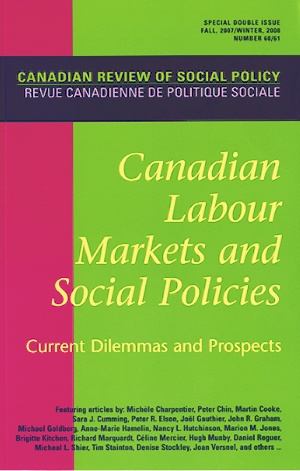Analysis of British Columbia Caseload for Data Persons Working With a Disability and Persons with Persistent and Multiple Barriers
Abstract
This paper is based on data received from the British Columbia Ministry of Employment and Incorrle Assistance (MEIA) 2fo llowing a Freedom of Information request. The data include caseload statistics for persons with a disability from September 2000 -July 2006. The analysis considers the overall composition of the caseload, and changes in key issues such as tale up of the Community Volunteer program and the utilization of earnings exemptions. An outline of the overall employment situation for persons with disabilities, followed by a brief discussion of the BC disability benefit system and the reforms introduced by the Liberal government in April 2002, are discussed. A tentative conclusion is made that the e~perience in BC would suggest that little, if any, savings are to be found in disability related benefits. The data appear to indicate that while enhancement to employment opportunities and additional income from earnings are important for persons wlth disabilities, their effects are limited in terms of numbers. The data also suggest that an enhanced focus on maximidng earnings exemptions may prove an effective strategy for reducing poverty amongst persons with disabilities (PWD). Finally, the data suggest significant numbers are and will remain dependent on benefits and consequently, it is critical for income assistance rates to be increased if the income security for persons with disabilities or multiple and persistent barriers to employment are to be improved. Cet article s'appuie sur des donn6es fournies par le minist2re de l'emploi et de l'aide au revenu (Ministry of Employment and Income Assistance3) de fa Colombie-Britannique h la suite d'une demande d'accds h l'infomation. Les donne'es comprennent les statistiques relatives au nombre de personnes handicape'es en Colombie-Britannique entre septembre 2000 et juillet 2006. L'analyse examine la composition globule de cette cat6gorie de personnes, de mgme que les changements relatifs h certains enjeux cks comme l'utilisation du programme communautaire de b6ne'volat et le recours aux exemptions de gains. L'auteur trace les grandes lignes de la situation d'emploi des personnes handicap6es et emmine bnkvement le systgme de pestations d'invalidite' de la Colombie-Britannique et les re'fomes apporte'es par le gouvernement liberal en avril2002. En guise de conclusion povisoire, l'article avance que, si l'on se fie h l'exemple de la Colombie-Britannique, les 6conomies &coulant d'une re'forme du systime de pestations d'invalidite' sont ne'gligeables, sinon nulles. Les donnees semblent indiquer que, si l'augmentation des possibilit6s d'emploi et des revenus additionnels provenant du travail est importante pour les personnes handicape'es, son effet est limite' quant au nombre de personnes qui en be'neficient. Les donne'es donnent e'galement h penser que l'augmentation des exemptions sur le revenu gagne' pourmit constituer une strate'gie eficace pour re'duire la pauvrete' c h s les personnes handicape'es. Enfin, toujours selon les donne'es, puisqu'un nombre consi&rable de personnes handicape'es sont et resteront &pendantes des pestations d'invalidite', il est essentiel de bonifier le taux d'aide au revenu dans le cadre d'une e'ventuelle ame'lioration de la se'curite' du revenu des personnes handicape'es ou des personnes qui se heurtent h de multiples et persistants obstacles h l'emploi.Downloads
Published
How to Cite
Issue
Section
License
1-The author guarantees that the manuscript is an original work not published elsewhere in print or electronically in whole or in part, except in abstract form, that the author has the full power to make this contribution, and that the manuscript contains no matter libelous or otherwise unlawful or which invades the right of privacy or which infringes any proprietary right.
2-The author guarantees that the manuscript has not been previously published in print or electronically and that if the manuscript contains any tables, figures or images fully reproduced or closely adapted from previously published material, the author must obtain the necessary permission from the author/publisher holding the original copyright prior to publication in CRSP. The author may be required to produce evidence of permission granted to CRSP’s editors.
3-As a condition of publication in CRSP, the author assigns all copyright to CRSP, including but not limited to the right to publish, republish, and otherwise distribute this manuscript in print, electronic, or other formats. As CRSP is a non-profit interdisciplinary scholarly journal, the author will receive no royalty or other monetary compensation for the assignment set forth in this agreement.
For the purpose of full disclosure, CRSP will not normally use the content provided by the author in a commercial venture, but for the purpose of disseminating the author’s content to as many readers as possible. For distribution, third parties engaging in commercial activities may be contracted to distribute the content globally, and such parties may make a profit out of the author’s content in their normal course of business. CRSP will not pay the author or reimburse the author in any form based on such commercial activities because the conduct of such commercial activities is outside the control of CRSP.
Any future reference to or use of this published material by the authors must acknowledge CRSP as the original place of publication.
PERMISSION REQUEST/ARCHIVING
Permission is given to author(s) receiving funding via Tri-Council Agencies, the Canadian Institutes of Health Research (CIHR), the Natural Sciences and Engineering Research Council of Canada (NSERC) and the Social Sciences and Humanities Research Council (SSHRC), to make their publications freely available in an Open Access repository within the stated deadline by the Tri-Council Agencies (12 months following publication). Archiving of publication must be a manuscript copy bearing none of the CRSP headers, footers or any other distinguishing marks. No links to the article on the CRSP website is permitted.
Permission requests from third parties to reproduce articles in part or full in academic/educational publications can be directed to the managing editor of CRSP, and will not be unreasonably denied.

